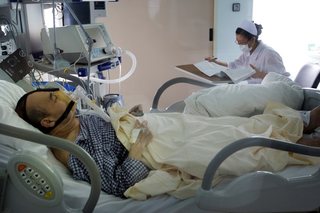Touted by the East German leadership as a barrier against "fascist provocation," the Wall was really an attempt to stop waves of skilled workers and educated people leaving a repressive state
Published:
10 November 2004 y., Wednesday
Touted by the East German leadership as a barrier against "fascist provocation," the Wall was really an attempt to stop waves of skilled workers and educated people leaving a repressive state. Around 3 million fled between 1945 and 1961, when the Wall went up. In time, it became etched in the Western consciousness as a symbol of inhumanity. More than 100 people were picked off by border guards while trying to escape; dozens of others were killed by mines.
However, by November 9, 1989, deep political shifts had prepared the ground for an earthquake. Leader Erich Honecker had been forced to resign and 4 million people had demonstrated for democracy. On that momentous day, the government's spokesman Guenther Schabowski announced that East Germans could go to West Germany if they applied for a visa.
Within minutes, people swarmed around the wall's border posts in what amounted to a siege. At midnight, they broke through to West Germany. That sounded the death knell for the Cold War and set the stage for German reunification a little more than a year later. But 15 years on, a very different kind of mass mobilisation took place. The demonstrations in Leipzig this August highlighted the economic plight of the former East German regions, where unemployment is double that of the western part.
When the old regime collapsed, many skilled workers found themselves on the wrong side of supply-and-demand economics.
Šaltinis:
euronews.net
Copying, publishing, announcing any information from the News.lt portal without written permission of News.lt editorial office is prohibited.
The most popular articles
 51-year-old mother of eight, sits beside her sick husband, Tuy Muy, 52, in Battambang Provincial Referral Hospital. He is lying on a bed with a stomach problem, battling nausea and vomiting.
more »
51-year-old mother of eight, sits beside her sick husband, Tuy Muy, 52, in Battambang Provincial Referral Hospital. He is lying on a bed with a stomach problem, battling nausea and vomiting.
more »
 The length of maternity and paternity leave are at the heart of a crucial vote in the plenary sitting of March 24-25.
more »
The length of maternity and paternity leave are at the heart of a crucial vote in the plenary sitting of March 24-25.
more »
 The perception women have of the EU, the way the economic and financial crisis is affecting women and the lessons to be learnt ahead of the 2014 elections are among the issues to be tackled during a colloquium being held at the European Parliament on Tuesday.
more »
The perception women have of the EU, the way the economic and financial crisis is affecting women and the lessons to be learnt ahead of the 2014 elections are among the issues to be tackled during a colloquium being held at the European Parliament on Tuesday.
more »
 To achieve quicker de facto gender equality, Commission and Member States should adopt and implement specific gender equality policies, Parliament said in a resolution adopted on Thursday.
more »
To achieve quicker de facto gender equality, Commission and Member States should adopt and implement specific gender equality policies, Parliament said in a resolution adopted on Thursday.
more »
 Are you thinking about setting up your own business or are you already a successful entrepreneur? The Erasmus for Young Entrepreneurs exchange scheme offers an excellent opportunity for new entrepreneurs to acquire relevant skills for managing a small or medium-sized enterprise (SME).
more »
Are you thinking about setting up your own business or are you already a successful entrepreneur? The Erasmus for Young Entrepreneurs exchange scheme offers an excellent opportunity for new entrepreneurs to acquire relevant skills for managing a small or medium-sized enterprise (SME).
more »
 The pain of divorce and separation is all too often accompanied by financial and emotional hardship when one parent lives abroad and refuses to provide financial help.
more »
The pain of divorce and separation is all too often accompanied by financial and emotional hardship when one parent lives abroad and refuses to provide financial help.
more »
 Most Europeans still do not know they can call 112 anywhere in the EU to contact the police, fire brigade or an ambulance.
more »
Most Europeans still do not know they can call 112 anywhere in the EU to contact the police, fire brigade or an ambulance.
more »
 Helping to meet Haiti's humanitarian, reconstruction and nation-building needs must be the EU's priority in tackling the earthquake's aftermath, says Parliament in a resolution approved on Wednesday.
more »
Helping to meet Haiti's humanitarian, reconstruction and nation-building needs must be the EU's priority in tackling the earthquake's aftermath, says Parliament in a resolution approved on Wednesday.
more »
 Further work is needed to continue improving access to safe drinking-water at home, sewerage systems and safe bathing water throughout the European Region.
more »
Further work is needed to continue improving access to safe drinking-water at home, sewerage systems and safe bathing water throughout the European Region.
more »
 Poor housing remains a blight across Europe and Tuesday evening MEPs will debate a plan to extend EU funding to help renovate and repair housing stock for the poorest people on the continent.
more »
Poor housing remains a blight across Europe and Tuesday evening MEPs will debate a plan to extend EU funding to help renovate and repair housing stock for the poorest people on the continent.
more »